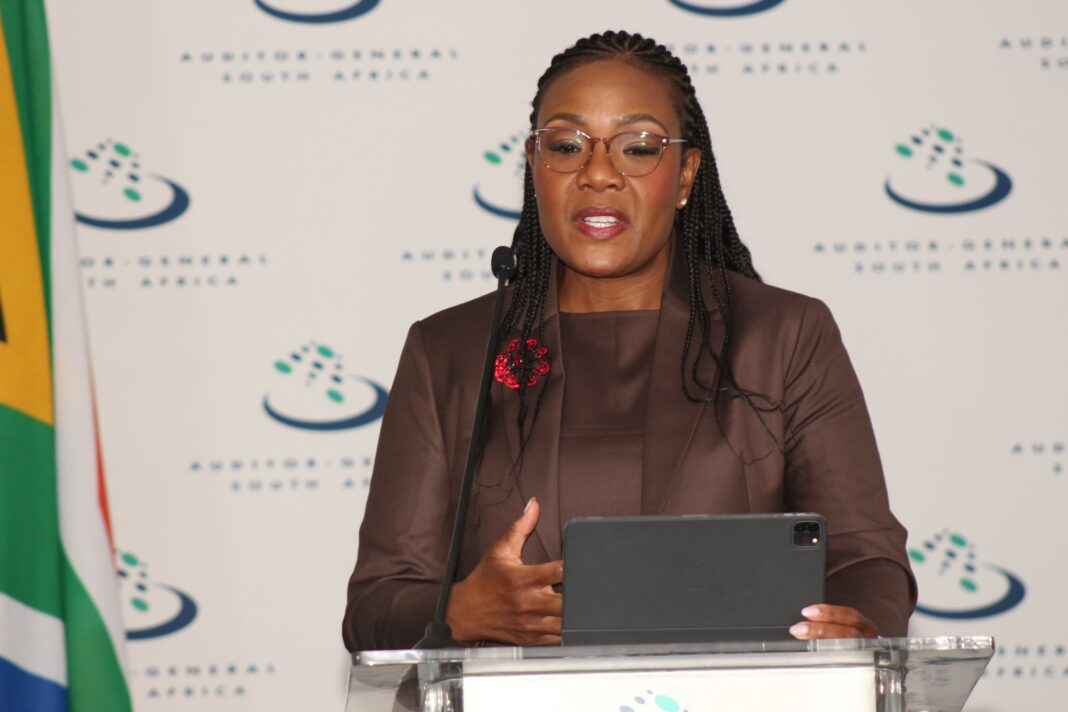By Johnathan Paoli
Auditor-General Tsakani Maluleke has identified systemic flaws that undermine service delivery despite improvements in financial transparency.
Presenting an evaluation of the country’s audit outcomes in Tshwane on Tuesday, Maluleke urged the new administration to address entrenched weaknesses in governance and accountability.
The AG’s report shows a stark contrast between progress in routine financial reporting and persistent underperformance among high-impact entities, which deliver essential services such as education, healthcare and infrastructure development.
These entities account for 77% of government expenditure and remain a critical concern.
“While the previous administration laid a foundation for financial transparency, high-impact auditees continue to face challenges in meeting their targets and maintaining financial discipline,” Maluleke said.
Over the 2018-2024 administrative term, irregular expenditure amounted to R406.83 billion, primarily driven by non-compliance with procurement and contract management legislation, which accounted for 68% of the total.
In most years, this category constituted over 85% of irregular expenditure, except in 2020-21, when issues at the National Student Financial Aid Scheme caused a spike in bursary-related non-compliance.
Fruitless and wasteful expenditure during this period reached R10.34 billion, with 84% attributed to high-impact auditees.
In 2023-24 alone, these expenditures surged by 49% to R2.57 billion, driven by entities like Transnet for project cancellations and overpayments, the Gauteng human settlements department for aborted housing projects, and the Free State Development Corporation for overvalued assets.
Overspending has also been a critical issue, with departments recording R38.83 billion in unauthorised expenditure over the term, with a 57% year-on-year increase to R7.19 billion in 2023-24.
This was due to poor intergovernmental coordination, ineffective resource management and a lack of accountability.
Public entities, however, showed a decline in overspending-related irregular expenditure, from R900,000 million to R170,000 million.
Maluleke identified three recurring issues plaguing government performance. They included inadequate planning and coordination across all government tiers, resource mismanagement such as poor financial oversight and procurement practices, and a culture of impunity, where non-compliance often goes unpunished.
She said the shortcomings hindered progress in areas critical to South Africa’s socio-economic development, such as housing, safety and job creation. She emphasised that addressing these root causes was essential for sustainable improvement.
Reflecting on the government’s handling of Covid-19 and flood relief, Maluleke commended aspects of the response, but pointed out inefficiencies that limited their effectiveness.
The AG said real-time audits during these crises revealed gaps in preparedness, procurement and contract management, highlighting the need for robust systems and accountability mechanisms.
To turn the tide, Maluleke outlined priority areas for reform, namely strengthening planning and alignment with development goals and building institutional capacity for governance and reporting.
Additionally, she called for investing in infrastructure and systems to support delivery, tackle financial mismanagement and procurement inefficiencies, and expand the use of the Material Irregularity process to enhance oversight and accountability.
The AG stressed the importance of fostering a culture of accountability among all role-players in the accountability ecosystem.
“Every stakeholder, from Parliament to provincial legislatures, must act decisively and collaboratively to uphold transparency and deliver tangible outcomes for citizens,” she said.
Despite the challenges, Maluleke expressed optimism about the new administration’s potential to drive meaningful reform, and said leveraging insights from audits and lessons from past crises, the government could improve service delivery and rebuild trust with citizens.
“Our commitment remains steadfast: to partner with and guide the public sector toward greater performance, accountability and transparency,” Maluleke said.
The AG said that with deliberate action, the foundations laid by the sixth administration could pave the way for a more efficient and responsive government.
INSIDE POLITICS

